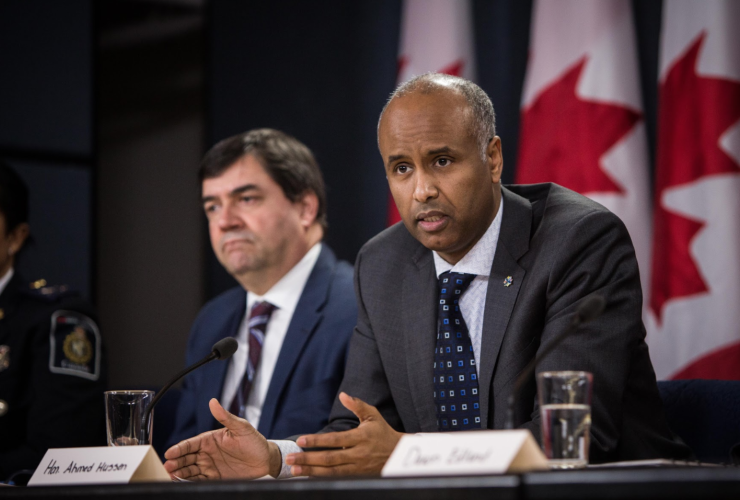Personal details about Canadian residents and visitors – but not Canadian citizens - will be automatically available to officials in Australia, New Zealand, the United States and the United Kingdom under an expansion of the ‘Five Eyes’ spy system.
Canada will have access to documents in the immigration systems of the other four countries to automatically screen applicants for Canadian work permits, study permits, travel visas, refugee status and permanent resident status. It will give the other ‘Five Eyes’ access to all immigration and visa files held in Canada. Ottawa won’t share records of Canadian citizens.
The new rules took effect May 17, though a published explanation of the regulations says that implementation began in March, 2017 and will continue in phases. That official explanation predicts the system will speed up visa application processing and thwart immigration fraud.
Speaking in Brussels on Thursday, Prime Minister Justin Trudeau broadly defended Canada’s intelligence-sharing agreements, including the ‘Five Eyes’ system that allows the five countries to share much of their intelligence information.
“Collaboration and co-operation between allies, friends and partners has saved lives and keeps all of our citizens safe,” he said at a meeting of the North Atlantic Treaty Organization, according to The Canadian Press.
Raises red flags
But several immigration experts say the new system poses a danger to refugees and others.
“It raises some real red flags when you hear of these ventures expanding,” said Efrat Arbel, assistant professor at the Peter A. Allard School of Law at University of British Columbia. “There are privacy rights, human rights and a real risk those rights will be overridden or denied.”
Vancouver immigration lawyer Peter Edelmann warned that the new system could lead to mistakes similar to the case of Maher Arar, a Syrian-born Canadian who was kidnapped in New York and tortured in Syria based on incorrect information provided to the Central Intelligence Agency by Canadian authorities.
Both Edelmann and Arbel warned that it will be difficult to find out if a global immigration file is accurate, and difficult to correct it if it is not.
“In general terms, this kind of information-sharing agreement can have severe repercussions for refugees,” Arbel said. “Decisions and determinations are shared, but the decision may be based on bad context or inaccurate facts. That information then follows a refugee their entire life and it can negatively impact their ability to get asylum.”
System retroactive
Edelmann said something as simple as a border official who doesn’t take good notes could have a dramatic impact on someone’s future. For example, he said, if a border officer’s notes in one country conflict with information provided by an applicant in a second country, the applicant might be accused of misrepresentation and be deported, or refused a permit or visa.
Edelman said he is also concerned that the system is retroactive and will include information that people thought would be kept inside Canada. Immigration files can contain sensitive information such as personal photos, personal emails and letters, the results of medical examinations and tests, allegations of torture and domestic abuse, criminal convictions, tax returns and financial records. Edelmann said it isn’t just information submitted after the new rules take effect that will be shared, but information included in any existing immigration file.
Mario Bellissimo is a Toronto immigration lawyer who edits several key publications in the field. He said it’s difficult to tell how the new rules will affect privacy and immigration until the government reveals exactly how it expects its officers to use the new powers.
Bellissimo said the government has been planning the system for at least eight years, but immigration lawyers still don’t know exactly how it’s going to be used.
“We all have a visceral reaction, of course we want to stop terrorists,” he said.
“But how pervasive will it be? We still don’t have the details.”
Bellissimo said recent cyber attacks on big companies and government departments have made him warier of the plan.
“How secure will the information be? Will it be stored domestically? Where will it be housed and held?”
Expert pleased by safeguards
Brenda McPhail is director of the privacy, technology and surveillance project of the Canadian Civil Liberties Association. She said she was pleased by several safeguards in the recently published regulations, particularly a requirement to destroy biometric markers like fingerprints, the obligation of the government to tell other countries when a file is corrected and the fact that the actual agreements will be made public.
“In general, on paper, many of the privacy protection provisions that are important are there,” she said.
The system allows for the automatic screening of applicants based on a fingerprint check in other jurisdictions.
A similar system is already in place with the United States. A pilot project was launched in 2013 with the other three ‘Five Eyes’ countries. Canadian officials have not publicly commented on the pilot, but Australian officials told media that it resulted in more than 20 rejections for Australian visas.
The system has been more controversial since the U.S. election because of changes in U.S. policy and U.S. security breaches.
“What will Donald Trump do with the Canadian information?” Edelmann asked. “Could Canadian information be used for something like his (Muslim) travel ban?”
The U.S. has faced backlash from other Five Eyes members for alleged security breaches, including President Donald Trump’s alleged release of classified information to Russian diplomats. This week British authorities stopped sharing information with the U.S. about the Manchester bombing after leaks about investigative findings to the U.S. media.






Comments